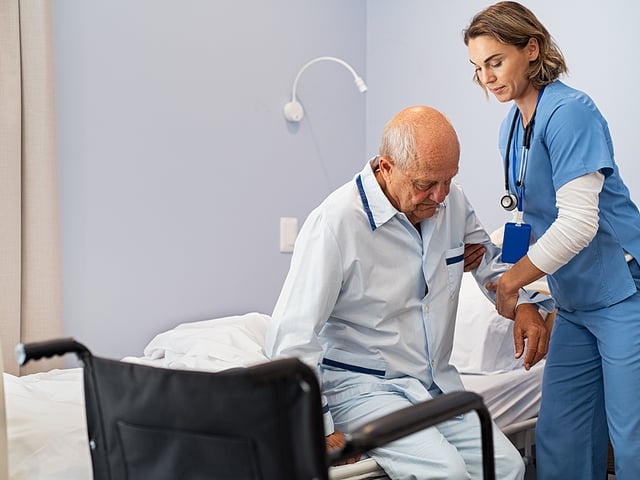
Caring for Patients with Dementia or Alzheimer’s Disease
Caring for someone with Alzheimer’s Disease or dementia can be one of the most challenging tasks a CNA faces during his or her career. In addition to taking care of the patient’s physical ailments, there are constant challenges that come with mental impairment. Often confused, patients may lash out when they do not understand what is happening. Helping to ease their minds by staying calm is one of the most important techniques, though there are other things that can greatly help when dealing with these patients.
Safety
It is common for Alzheimer’s or dementia patients to wander and become lost or take the wrong actions when they are confused. However, there are some small actions that can be taken to decrease their risk.
- Use locks or child gates to block stairs, doors, and windows.
- Provide an ID bracelet/necklace with a phone number.
- Keep medications, sharp objects, poisonous materials, and other potentially harmful materials locked up.
- When possible, activate controls for stoves and electronics.
- Do not speak loudly, restrain the patient, or make sudden moves.
Communication and Memory
When communicating with confused patients, there are several strategies that tend to help them understand better.
- Ask yes or no questions when possible.
- Provide a limited number of choices for questions. Use memory aids such as a daily routine list or calendar to remind them of activities.
- Say the patient’s name and make eye contact to get his or her attention.
- Make calm, positive, and reassuring statements in a soothing tone.
- Ask if they need to use the restroom or want some water at periodic intervals.
“Different” Perceptions
One of the common scenarios with an Alzheimer’s or dementia patient is when they misread or misinterpret a situation. This is a particularly difficult situation to handle, since most patients are oblivious to the fact that they have any cognitive impairment. In many instances, their ability to handle life functions—like driving or cooking—may change, yet they are unaware of the change. The best way to respond is to stay calm and offer a brief and simple explanation, with memory aids if they help in the situation. At times, the patient may be reliving another era in the past, and if it is safe to do so, you may allow him or her to just speak about those recollections. But above all, do not take anything personally. Understanding their lack of control of the situation can help you to recognize that any anger, confusion, or frustration is typically not directed at you.
Keep Reading

Certified Nursing Assistant Exam Blog
How Long Does it Take to Become a CNA?
As a profession on the frontline of healthcare, Certified Nursing Assis…

Certified Nursing Assistant Exam Blog
How to Do Well on the CNA Skills Test
Over 1.3 million nursing assistants work in our healthcare system today…

Certified Nursing Assistant Exam Blog
What Does a Nursing Assistant (CNA) Do?
Are you interested in exploring medical careers? The healthcare industr…